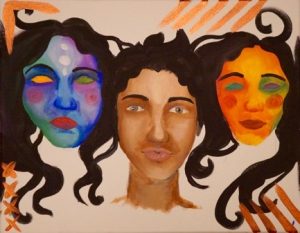A Youth Creative Arts Knowledge Translation Project
“It’s been really stressful for me, and I think it was really avoidable in a lot of ways.”
“We suffer a lot and it’s really, really difficult.”
“It absolutely sucks. I don’t know how to put it… it kind of eats away at you.”
This is how trans youth describe their experiences when facing barriers to accessing needed hormone therapy in BC. The Trans Youth Hormone Therapy Decision Making Study explores how trans youth and their parents make decisions about initiating hormone therapy and how health care providers navigate ethical challenges arising in practice with trans youth and their families. In addition to presenting findings at academic conferences and publishing in peer-reviewed journals, a goal of this project since its inception has been to disseminate results through a youth-driven, creative arts-based knowledge translation project. This spring, that project became a reality.

- Creative writing and poetry offer insight into lived experiences of trans youth.
- Paintings depict challenges youth encountered when trying to access gender health care.
- Songs tell stories of challenges, necessary catalysts for change and outcomes youth hope for.
- Dramatic scenes depict positive health care interactions, to help health care providers understand how youth would like to see health care delivered.
- A board game simulates barriers and facilitators to gender health care experienced by trans youth, designed to convey how much of their journeys were left to chance and how systems of care need to be improved to better meet the needs of trans communities.


This research was conducted by Beth Clark (Interdisciplinary Studies Graduate Program PhD Candidate), who is supervised by Dr. Elizabeth Saewyc in the School of Nursing. Beth worked with Trans Care BC, the Trans Health Information Program, and the Catherine White Holman Wellness Centre for several years, and is no serving as a clinical ethicist at the Provincial Health Services Authority. Beth also brings a background in the creative arts, having practiced for several years as a music therapist and clinical counsellor with youth and families.
For updates on this project, visit SARAVYC.ubc.ca


